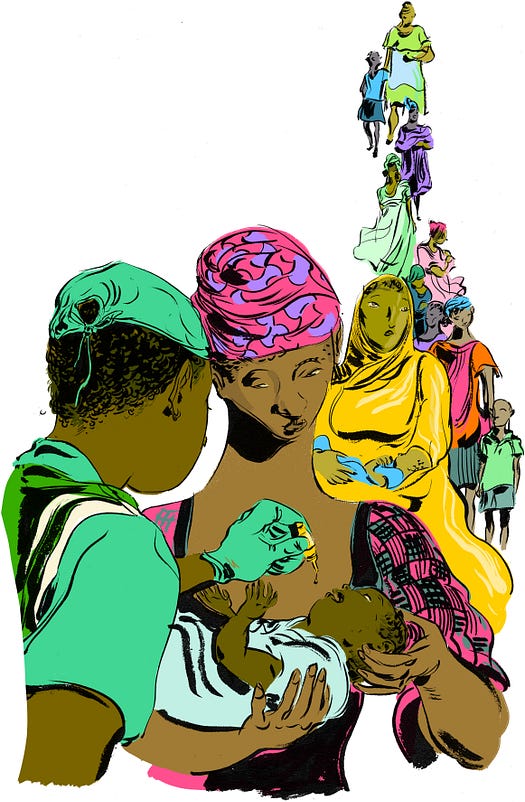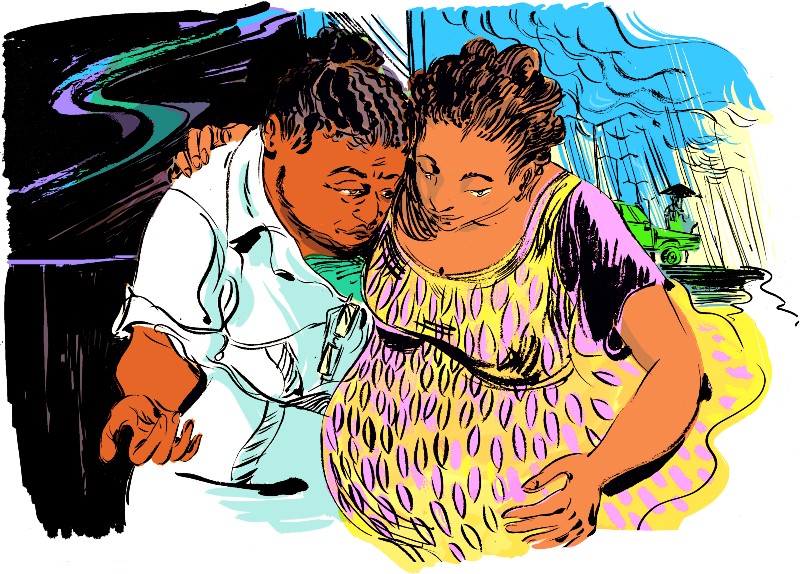By Chimamanda Ngozi Adichie
Illustrations by Wesley Allsbrook
How softly the rain fell that Monday morning when my water broke. Because I was used to the raging downpours of Lagos, this quiet patter calmed me, filled me with peace. My husband Omoregie was at work and so our neighbor took me to the hospital, my dress slightly damp, my heart full of expectation. My firstborn child.
The nurse on duty was Sister Chioma, a woman with an unsmiling face who liked to crack sharp-tongued jokes. During my last check up, when I complained about the backache brought on by my pregnancy, her retort was, “Did you think about backache when you were enjoying it?”
She checked my cervix and told me it was early. She encouraged me to walk up and down the ward.
“You must be happy that your first is a boy,” she said.
I shrugged. “As long as the baby is healthy.”
“I know you are supposed to wait until he is born to decide on a name but I’m sure you already have something in mind,” she said.
“Oh.” She paused. “I didn’t know your husband was Yoruba.”
“But Olikoye is a Yoruba name.”
“Why?” she asked. My contractions were slow. I told Sister Chioma to sit down and I would tell her the story.
My father’s first child was a girl. He said she was a loud squalling baby who grasped his finger with surprising strength, and he knew it meant she would be tough. But she died at the age of four months. The second, a boy, was not yet four months old before he died. Some people from my father’s family said my mother was a witch, eating her children, trading their innocent hearts in exchange for her own long life. But, at that time, other babies in our village in Edo were dying too. They got sick with watery shit and weak eyes. Some people said the diarrhea was punishment from God. The Christians prayed in church. The Muslims prayed at the mosque. The old people performed sacrifices. Still, babies died, and their tiny still bodies were wrapped in cloth and buried, and it seemed senseless that they had even been born at all.

It was 1985. My father was working as a driver at the Ministry of Health. He was in the general pool, a lowly position. One day, he picked up a visiting dignitary from the airport, dropped him at his hotel, and then discovered, lodged in the back seat of the car, a thick envelope of cash that had slid out of the man’s bag. He returned it immediately. The man was so pleased — and surprised—that he told the new Minister of Health about it. Two days later, the new Minister asked for my father. “I want you to be my driver,” The Minister said. “I value honesty.”
The Minister’s name was Dr. Olikoye Ransome-Kuti. He had big sleepy eyes and seemed to come from another time in the past when old-fashioned integrity was easy. His simplicity surprised my father. He was not interested in the usual carousing of the powerful, no late nights and drinking and trysts, and my father did not have to guard any secrets for him. He ate breakfast with his family every morning, and took walks with his wife in the evening, and played tennis with his children on weekends. He listened attentively, those half-closed eyes so intent that my father, at first, felt uncomfortable when they were trained on him.
The Minister asked my father about his family, and my father told him everyone was fine. The Minister asked how many children he had, and my father said none yet, but that his wife was pregnant and due in a few weeks. (My mother as pregnant with me.) Then the minister asked a question that startled my father. “How many of your children have died?”
My father stuttered and said, “Two, sir, but we are praying that it will not happen again.” The Minister told him it was good to pray, but there was something else he had to do. “Our children are dying of simple illnesses and that must stop. I want you to take me to your village. I have started a program in Lagos but I want to start others in different parts of the country. We will go to your village next week.” It took my heavy-tongued father a while to find his voice and say, “Yes sir.”
In my father’s village, the Minister walked around with his assistants, meeting people and asking them questions and listening to them. He showed women how to mix sugar and salt and clean water to give their children who had diarrhea and he told them about washing their hands with soap and he told them the Universal Primary Health Care center would be open in a month. Once it was open, every baby would receive vaccines.
He showed them photographs of bright-eyed babies in Lagos and he told them immunizations were like small precious gifts for babies. They cheered and clapped. In the eyes of the villagers, my father was a star. No minister had ever come to them before.
Who even knew that our small village existed? But my father kept telling them that he had done nothing, that it was the minister who insisted on coming. Years later, when my father told me the story, I could still see his eyes full of things I could not name.
“The Minister treated all of us like human beings,” he said. “Like human beings.”

It took mere moments. A baby’s small open mouth and a drop of liquid. A baby’s warm arm and a small injection. It took that to save the lives of the babies born that year in my village, and in the villages around us and those far from us, in Calabar and Enugu and Kaduna. It took that to save my life. I was born in 1986. I often tried to imagine myself being immunized, in my mother’s arms, in the new clinic the minister built. Women filled the passages. The treatment was free. At the other end was the family planning unit where nurse was talking to a roomful of women, sometimes making jokes that made them laugh. My mother joined them.
Years later, she told me that the reason I did not die was that small injection in my arm, but the reason I was able to go to school was family planning. My sister was born two years after me, and my brother two years after her, and my mother remembered the words of the family planning nurse who told her to “have the number of children that you can train well. Otherwise you will not be able to train even one of them well.”
Because of the Minister, my father came to know Nigeria well. The Minister went to other interior villages and towns, and my father drove him through the flat roads of the North and the undulating roads of the south. He followed the Minister to the clinics, watched him speaking, gesticulating, explaining, cutting ribbons to open health centers.
Everywhere they went, people followed the Minister. Some just wanted to touch him, to shake his hands. Others brought gifts. “No, no,” the minister said to my father, when he saw the yams and plantains and chickens. “Give it back to them. Tell them that they should keep it for me.”
I first met the Minister when I was six years old. I was in Primary One, and my father told him I came first in class and the Minister asked him to bring me to his house. I expected to wait in the kitchen, and felt awkward to be asked into the living room, into the sinking softness of the carpet and the smell of clean and new things. He appeared with his wife, both of them smiling. They gave me a book. A Childs Illustrated Book About The Body.
“Thank you, sir, thank you, ma,” I said, holding the book tighter than I had ever held anything in my young life.
Sister Chioma was squeezing my hand.
“So you knew him personally,” she said. “I finished nursing school the year he was appointed Minister.”
Her tone was different, less flat, more emotional. It was then I noticed that Sister Chioma, unsmiling, hard Sister Chioma, had tears in her eyes.
“It was because of Olikoye Ransome-Kuti that so many people in Nigeria did not die,” she said quietly, and I knew she had her own story about the Minister. Perhaps she would tell me the story later, or perhaps she would not, but it pleased me that we had a story in common.
“He was the best health minister this country has ever had,” she said, standing up and hastily wiping her eyes. My contractions were now shorter and sharper. Sister Chioma said it was perhaps time to push, and she got up to call the doctor.
Outside the rain continued to fall gently until Olikoye was born.
This story originally appeared in The Art of Saving a Life, a collection of stories about how vaccines continue to change the course of history, commissioned by the Bill & Melinda Gates Foundation.




